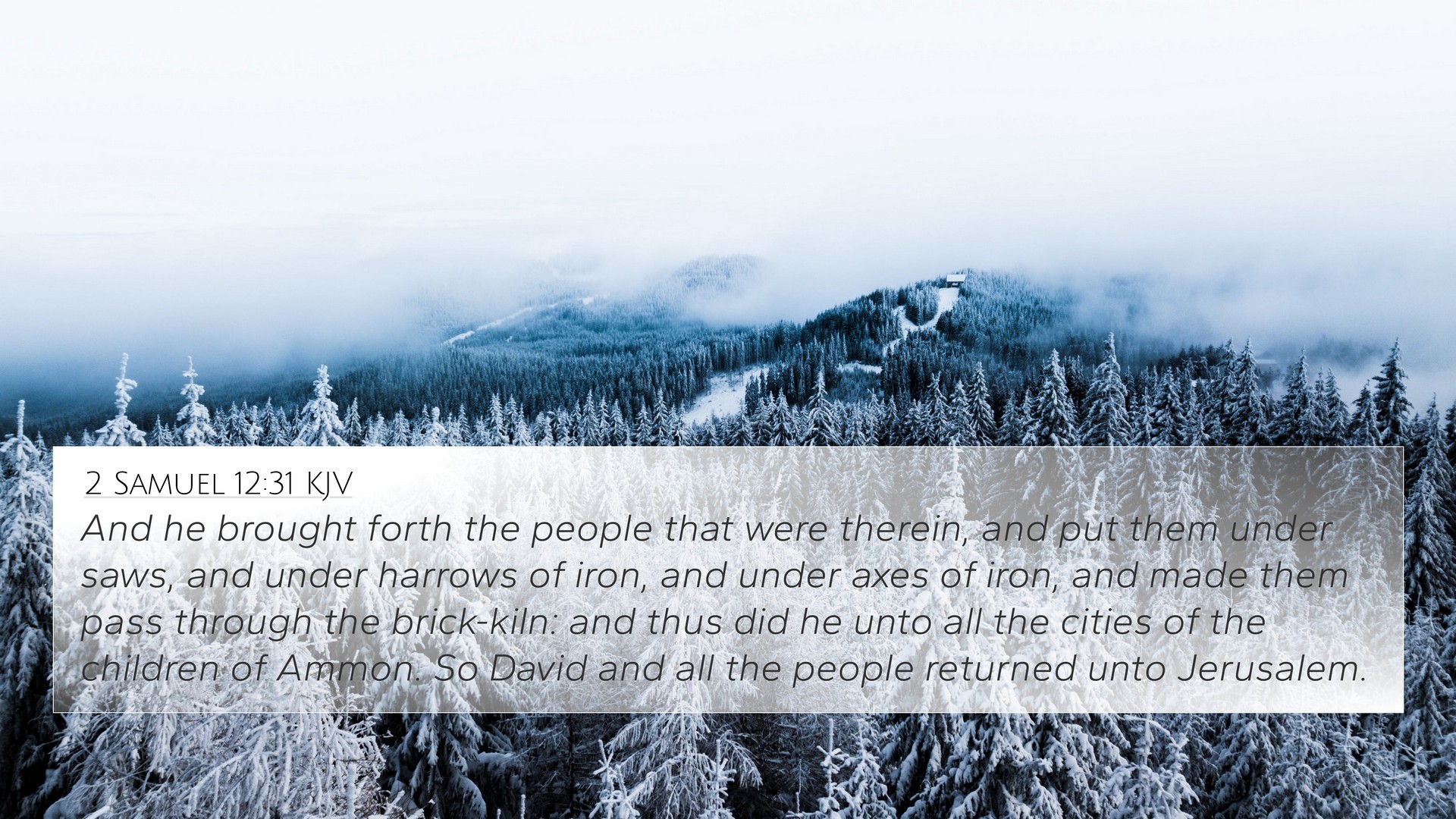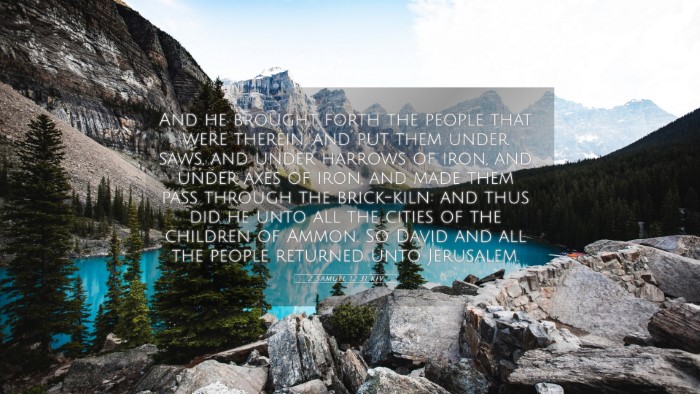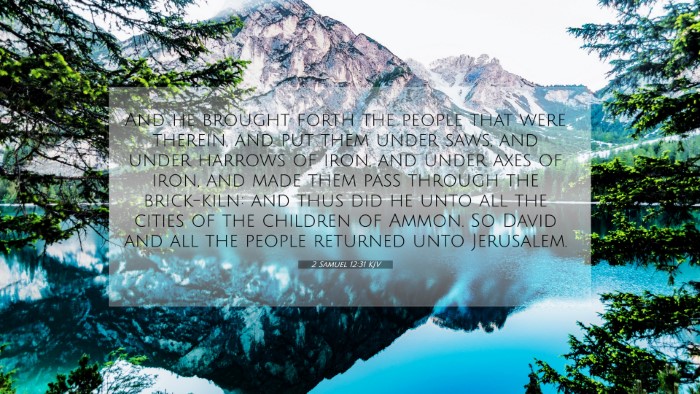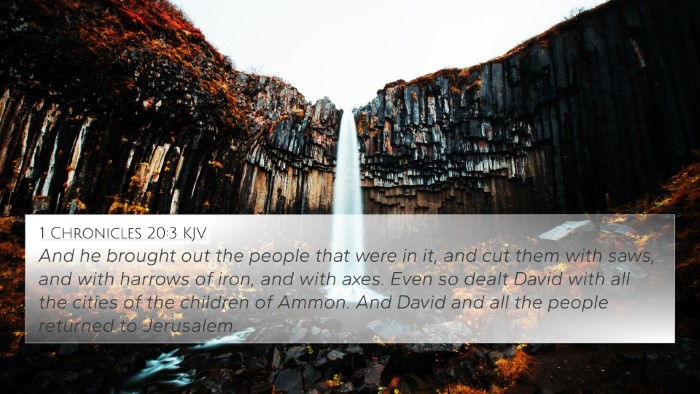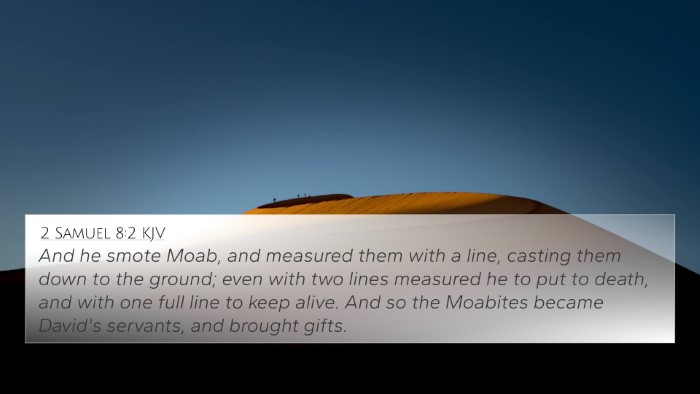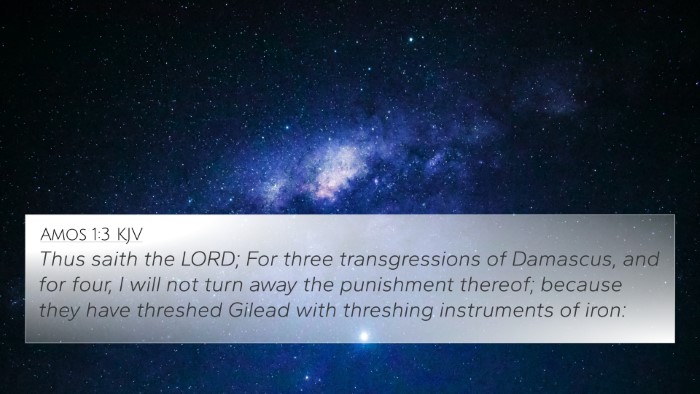Biblical Commentary on 2 Samuel 12:31
Verse Reference: 2 Samuel 12:31 - "And he brought out the people that were therein, and put them under saws, and under harrows of iron, and made them pass through the brickkiln: and thus did he unto all the cities of the children of Ammon. So David and all the people returned unto the city." (KJV)
Summary of Meaning
The verse narrates a part of King David's military campaigns against the children of Ammon following the death of Uriah. The language describes a brutal treatment of the Ammonites as David aims to consolidate his power.
Insights from Commentaries
Matthew Henry's Commentary
Matthew Henry emphasizes that David's actions were a demonstration of divine justice against the enemies of Israel. He expresses that David's victory was not simply a matter of military might but also a fulfillment of God’s promise to protect His people. The brutality highlighted in the verse illustrates the severity of judgment against those who oppose God's will.
Albert Barnes' Commentary
Albert Barnes focuses on the military conquest and the harsh treatment meted out to the Ammonites, viewing it as a reflection of the serious nature of rebellion against the king of Israel. Barnes suggests that this act was also meant to instill fear in neighboring nations, reinforcing David's reign. He adds that such actions, though severe, were not uncommon in the context of ancient warfare.
Adam Clarke's Commentary
Adam Clarke discusses the cultural and historical context of such military actions. He notes that these methods—saws, harrows, and brickkilns—were commonly used torture techniques in ancient warfare. Clarke indicates that through this passage, we witness both the justice of David’s reign and the tragic consequences of sin within the broader narrative of Israel's history.
Bible Cross-References
- 1 Chronicles 20:3: Describes the treatment of captives in war.
- Deuteronomy 20:10-14: Instructions on how to deal with conquered cities.
- 2 Samuel 10:1-5: Background on the conflict with the Ammonites.
- Psalm 137:8-9: Reflects on the destruction of enemies in the context of Babylonian exile.
- Genesis 49:19: Prophecy concerning the descendants of Gad regarding violent conflict.
- Isaiah 22:2: References the city that was once full of joy, highlighting judgment and desolation.
- Galatians 6:7: Addresses the principle of reaping what one sows, especially in the context of justice.
Thematic Connections
This verse connects thematically to several broader concepts in scripture regarding justice, warfare, and divine retribution. The brutal treatment of enemy combatants serves as a reference point for discussions on morality in warfare and obedience to divine mandates.
Exploring Connections Between Bible Verses
Understanding 2 Samuel 12:31 requires analysis of related passages that discuss themes of divine justice and Israel's military campaigns. Cross-referencing these verses provides insights into God's character and His dealings with nations:
- Understanding Divine Justice: Connecting with Psalm 94:1, which calls for God to "show yourself" against evildoers.
- Comparative Analysis of Warfare: Jeremiah 50:29, discussing the pursuit of Babylon and what is expected of God's people.
Utilizing Cross-Reference Tools
Utilizing cross-reference tools, such as a Bible concordance or study guide, can deepen the understanding of texts that highlight similar themes or historical narratives. For those studying the Bible, these tools are invaluable in tracing connections and exploring inter-Biblical dialogue.
Conclusion
2 Samuel 12:31 presents a difficult image as informed by the commentaries. The harsh treatments administered by David may prompt discussions on justice, divine command, and the realities of ancient warfare. Through the lens of other scriptures, believers can explore these themes and their implications for understanding God's will and the nature of conflict.
